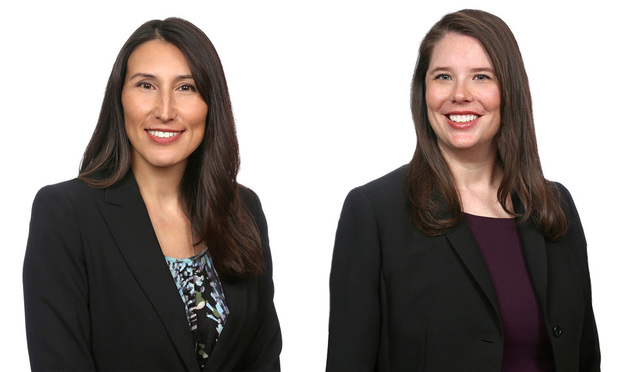Avoid Issues When Practicing Law in Other States
Because it has become relatively easy to practice law from anywhere, attorneys can at times forget that states have not become any more lenient when it comes to the unauthorized practice of law.
September 05, 2018 at 12:45 PM
6 minute read
 Shari Klevens, left, and Alanna Clair, Dentons (photo: Courtesy Photo)
Shari Klevens, left, and Alanna Clair, Dentons (photo: Courtesy Photo)
Because many businesses operate on a national (or even global) scale, it is unsurprising that those businesses often want their attorneys to be able to do the same. Thus, it is increasingly common for attorneys to have practices that span multiple jurisdictions. Practicing law in different jurisdictions has never been easier thanks to the internet and other technological advances, which can allow attorneys to communicate with clients, advertise, and even file documents no matter where they are located.
However, because it has become relatively easy to practice law from anywhere, attorneys can at times forget that states have not become any more lenient when it comes to the unauthorized practice of law, which can occur even if the attorney never sets foot in the state. Below are some issues to consider for out-of-state attorneys practicing in California and elsewhere.
The California Rules
As it is in many other jurisdictions, the unauthorized practice of law is taken seriously in California. Section 6125 of the California Business and Professions Code provides that “[n]o person shall practice law in California unless the person is an active member of the State Bar.” Rule 5.5 of the California Rules of Professional Conduct (as revised effective Nov. 1, 2018) further states that lawyers not admitted to practice law in California shall not either “establish or maintain a resident office or other systematic or continuous presence in California for the practice of law” or “hold out to the public or otherwise represent that the lawyer is admitted to practice law in California.”
For litigators, pro hac vice admission is typically an option for those attorneys not admitted in California. However, for other matters, attorneys may need to consider what constitutes the “practice of law” to determine whether their practice runs afoul of the rules. On this issue, as noted above, California courts have rejected “the proposition that the term 'practice law in California' is limited to the situation in which an attorney is physically present in the state when legal services are rendered.” Golba v. Dick's Sporting Goods, 238 Cal. App. 4th 1251, 1262, 190 Cal. Rptr. 3d 337, 345 (2015) (citing Birbrower, Montalbano, Condon & Frank v. Superior Court, 17 Cal. 4th 119, 128-29, 949 P.2d 1, 5 (1998), as modified (Feb. 25, 1998)).
Instead, in Birbrower, the California Supreme Court held that practicing law in California “entails sufficient contact with the California client to render the nature of the legal service a clear legal representation.” Among the considerations are whether the attorney “created a continuing relationship with the California client that included legal duties and obligations.” However, the court noted that “[m]ere fortuitous or attenuated contacts will not sustain a finding that the unlicensed lawyer practiced law 'in California.'”
Accordingly, out-of-state attorneys may wish to consider the extent to which services requested of them will involve contacts within California before agreeing to the representation. Where the services may fall on the wrong side of the line set forth in Birbrower, attorneys may not only face accusations relating to the unauthorized practice of law, but also may find that they cannot recover their fee. Indeed, the court in Golba (relying on Birbrower) disallowed recovery of any of the fees earned by an out-of-state attorney while improperly rendering services in California, which amounted to the large majority of the attorney fees at issue in the matter.
Schoenefeld v. Schneiderman
To avoid any doubt and to help develop a multijurisdictional practice, some attorneys will address this concern by seeking admission to the bar of more than one state. Multiple state bar memberships can also be common in areas straddling the borders of one or more states. However, perhaps surprisingly, attorneys may not be in the clear even after they go through the process of obtaining admission to the bar of another state.
For example, New York and other states (such as Delaware) have attempted to restrict the ability of nonresident attorneys to practice in their state, even where the attorney is officially licensed to practice in that state. Specifically, N.Y. Judiciary Law Section 470 provides that a person admitted to the New York bar but residing in another state must maintain an “office for the transaction of law business” in New York in order to practice law in New York.
This law was the subject of a recent lawsuit, Schoenefeld v. Schneiderman, that garnered much interest in the legal community because it raised constitutional issues that had the potential to impact the restrictions on out-of-state attorneys enacted by states across the country. See 821 F.3d 273 (2d Cir. 2016). After protracted litigation, including a certified question to the New York Court of Appeals, the Second Circuit finally reached the constitutional issue of whether Section 470 violates the Privileges and Immunities Clause. The Second Circuit rejected the challenge to Section 470, concluding that “the in-state office requirement was not enacted for the protectionist purpose of burdening non-resident attorneys in practicing law in New York.” See 821 F.3d at 279. Instead, the court viewed the law as simply attempting to level the playing field between resident and nonresident attorneys to ensure that all attorneys have some physical presence in New York.
The attorney challenging the law subsequently filed a petition for a writ of certiorari that received support from industry groups, including the filing of an amicus brief by the Association of Professional Responsibility Lawyers. APRL observed in its brief that Schoenefeld “presents an issue of considerable importance to the ever-expanding population of lawyers who live and practice outside their states of admission.” However, despite these efforts, the U.S. Supreme Court declined to review the case last year.
Nonetheless, given the increasing demand for attorneys to develop multijurisdictional practices, it is likely that similar issues will be addressed in the future and that states will continue to re-evaluate the logic of restrictions on out-of-state attorneys in today's world.
Shari L. Klevens is a partner at Dentons U.S. and serves on the firm's U.S. board of directors. She represents and advises lawyers and insurers on complex claims, is co-chairwoman of Dentons' global insurance sector team, and is co-author of “California Legal Malpractice Law” (2014). Alanna Clair is a partner at Dentons U.S. and focuses on professional liability defense. Klevens and Clair are co-authors of “The Lawyer's Handbook: Ethics Compliance and Claim Avoidance.”
This content has been archived. It is available through our partners, LexisNexis® and Bloomberg Law.
To view this content, please continue to their sites.
Not a Lexis Subscriber?
Subscribe Now
Not a Bloomberg Law Subscriber?
Subscribe Now
NOT FOR REPRINT
© 2025 ALM Global, LLC, All Rights Reserved. Request academic re-use from www.copyright.com. All other uses, submit a request to [email protected]. For more information visit Asset & Logo Licensing.
You Might Like
View All
Build It and They Will Come: Tips to Market Your Practice as a Junior Attorney
6 minute read
Yelp Sues Google for Alleged Antitrust Violations, Citing Previous 'Watershed' Government Ruling

There's Something in the Water: San Diego Is Once Again a Hot Market for National Law Firms
6 minute read
What Happens When You Go Viral? How a Law Firm Associate Manages Her Social Media Success
5 minute readTrending Stories
- 1ACC CLO Survey Waves Warning Flags for Boards
- 2States Accuse Trump of Thwarting Court's Funding Restoration Order
- 3Microsoft Becomes Latest Tech Company to Face Claims of Stealing Marketing Commissions From Influencers
- 4Coral Gables Attorney Busted for Stalking Lawyer
- 5Trump's DOJ Delays Releasing Jan. 6 FBI Agents List Under Consent Order
Who Got The Work
J. Brugh Lower of Gibbons has entered an appearance for industrial equipment supplier Devco Corporation in a pending trademark infringement lawsuit. The suit, accusing the defendant of selling knock-off Graco products, was filed Dec. 18 in New Jersey District Court by Rivkin Radler on behalf of Graco Inc. and Graco Minnesota. The case, assigned to U.S. District Judge Zahid N. Quraishi, is 3:24-cv-11294, Graco Inc. et al v. Devco Corporation.
Who Got The Work
Rebecca Maller-Stein and Kent A. Yalowitz of Arnold & Porter Kaye Scholer have entered their appearances for Hanaco Venture Capital and its executives, Lior Prosor and David Frankel, in a pending securities lawsuit. The action, filed on Dec. 24 in New York Southern District Court by Zell, Aron & Co. on behalf of Goldeneye Advisors, accuses the defendants of negligently and fraudulently managing the plaintiff's $1 million investment. The case, assigned to U.S. District Judge Vernon S. Broderick, is 1:24-cv-09918, Goldeneye Advisors, LLC v. Hanaco Venture Capital, Ltd. et al.
Who Got The Work
Attorneys from A&O Shearman has stepped in as defense counsel for Toronto-Dominion Bank and other defendants in a pending securities class action. The suit, filed Dec. 11 in New York Southern District Court by Bleichmar Fonti & Auld, accuses the defendants of concealing the bank's 'pervasive' deficiencies in regards to its compliance with the Bank Secrecy Act and the quality of its anti-money laundering controls. The case, assigned to U.S. District Judge Arun Subramanian, is 1:24-cv-09445, Gonzalez v. The Toronto-Dominion Bank et al.
Who Got The Work
Crown Castle International, a Pennsylvania company providing shared communications infrastructure, has turned to Luke D. Wolf of Gordon Rees Scully Mansukhani to fend off a pending breach-of-contract lawsuit. The court action, filed Nov. 25 in Michigan Eastern District Court by Hooper Hathaway PC on behalf of The Town Residences LLC, accuses Crown Castle of failing to transfer approximately $30,000 in utility payments from T-Mobile in breach of a roof-top lease and assignment agreement. The case, assigned to U.S. District Judge Susan K. Declercq, is 2:24-cv-13131, The Town Residences LLC v. T-Mobile US, Inc. et al.
Who Got The Work
Wilfred P. Coronato and Daniel M. Schwartz of McCarter & English have stepped in as defense counsel to Electrolux Home Products Inc. in a pending product liability lawsuit. The court action, filed Nov. 26 in New York Eastern District Court by Poulos Lopiccolo PC and Nagel Rice LLP on behalf of David Stern, alleges that the defendant's refrigerators’ drawers and shelving repeatedly break and fall apart within months after purchase. The case, assigned to U.S. District Judge Joan M. Azrack, is 2:24-cv-08204, Stern v. Electrolux Home Products, Inc.
Featured Firms
Law Offices of Gary Martin Hays & Associates, P.C.
(470) 294-1674
Law Offices of Mark E. Salomone
(857) 444-6468
Smith & Hassler
(713) 739-1250






